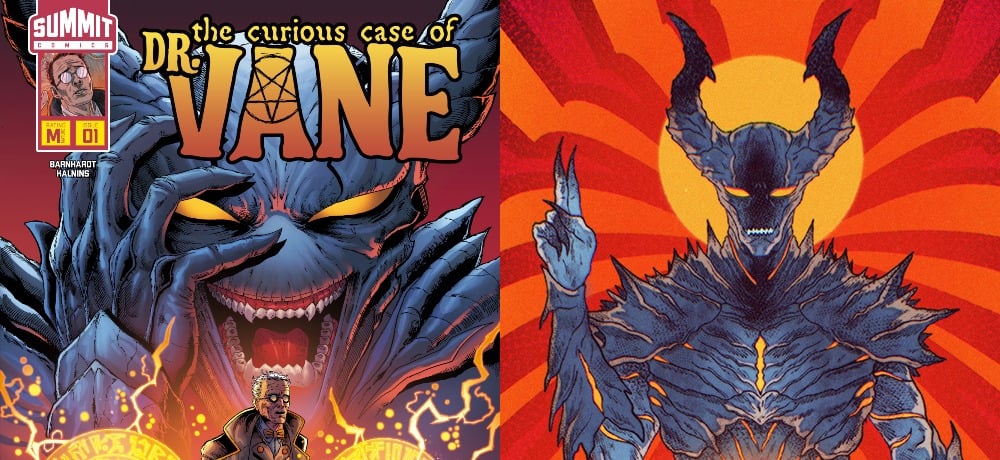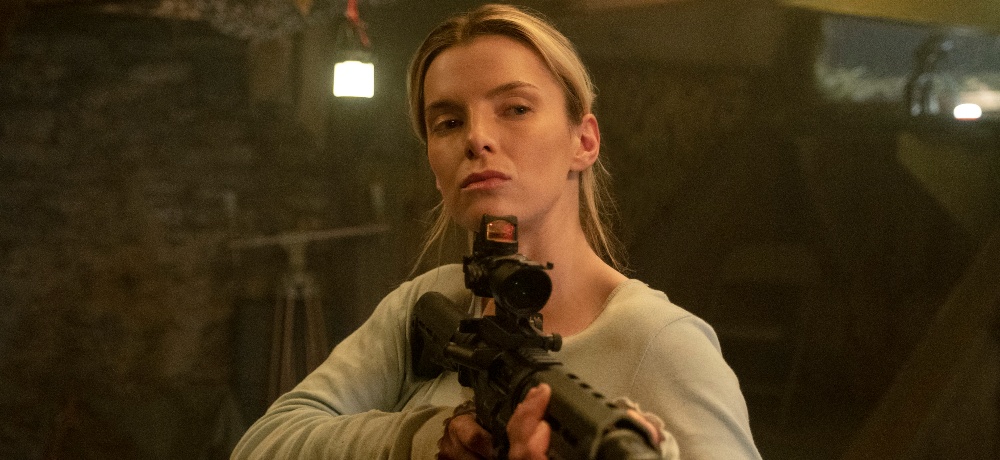






Arriving in theaters nationwide this Friday, March 13th, is the highly anticipated—and equally controversial—horror thriller, The Hunt. Co-written and executive produced by Nick Cuse, and loosely inspired by Richard Connell’s classic 1924 short story, “The Most Dangerous Game,” in The Hunt: "...a bunch of elites gathers for the very first time at a remote Manor House to hunt humans for sport. But the elites’ master plan is about to be derailed because one of the hunted, Crystal (Betty Gilpin), knows The Hunters’ game better than they do. She turns the tables on the killers, picking them off, one by one, as she makes her way toward the mysterious woman (Hilary Swank) at the center of it all."
Daily Dead recently had the opportunity to speak with Cuse, and he discussed how he worked with his co-writer, Damon Lindelof, to infuse the polarizing elements of the internet conspiracy theories the story was inspired by into the story. The first-time feature film screenwriter/ producer also talked about how Blumhouse Productions helped Cuse and his fellow filmmakers, including director Craig Zobel, tell the political horror story they were interested in making.
Thanks for taking the time to speak with us, Nick. The Hunt is a timely and provocative new satirical thriller about the class divide in modern American society. How did you become involved in co-writing the script for the movie with Damon Lindelof, and what was the process of getting the screenplay together?
Nick Cuse: I was a writer for Damon Lindelof on The Leftovers, and we edited the penultimate episode, which we also co-wrote, and Craig Zobel actually directed. At lunch, we were talking about what was next, because The Leftovers was ending. Damon said, "I've always wanted to write a Blumhouse movie." I said, "Yeah, that would be awesome." He was like, "We could write it, and Craig could direct it. I think 'The Most Dangerous Game' would be great to try to do in that genre." I was like, "Let's do it!" He said, "Well, the thing is, you need a really good reason why the people who are hunting people are hunting people. So we need that piece first."
Then we started exchanging ideas, and throwing things back and forth with each other. One of them was this story that was happening, or had happened recently, called Pizzagate, which is based on this phone hack of Hillary Clinton's campaign manager. The conspiracy going around on message boards was that this Comet pizza restaurant in D.C., which was a big Democratic campaign stop, actually had a child sex trafficking ring in the basement. Then someone actually went to try to free the kids with a gun, which was a scary thing, and there was no basement. So we just thought that was a really interesting story, and we started talking about conspiracies, and everything came out of that.
While I was watching the film, I found it interesting that the story is told from both sides of view, including Hilary Swank's character, who's the leader of the hunters, to all the characters who were being hunted, including Crystal . What was the process like of figuring out how much of a balance you would have, going between both sides?
Nick Cuse: We thought making these very conscious, well-educated, wealthy people—who are probably from big cities and big corporate careers—the villains felt like a really fun idea. Damon and I both live in L.A., and we're screenwriters. It felt like a person that you would see around Brentwood, which is where our offices were. There was a familiarity there, and an excitement to make fun of that, because it was something that we knew. I think having villains that were both capable, and also somewhat amusing in their unawareness of the irony of what they were doing, was really exciting.
As far as the other perspectives, whoever you meet who wakes up in the clearing, and not knowing how they got there, is who you're going to be rooting for. So we thought it would be fun to tell a story about rooting for someone that you didn't necessarily expect to be the lead of this movie. Even when you meet and get to know them, they don't turn out to be exactly what you thought. I feel like Betty's performance as Crystal is hopefully doing that.
Speaking of when the viewers first meet the characters who are being hunted in the field, I found that part of the story to be interesting. Certain characters are introduced, and it seems like the story will be told from their perspectives. But then they ultimately didn't become the protagonist, and Crystal becomes the main character on that side. What was the experience like of really building her character, and showing what she was going through overall throughout the movie?
Nick Cuse: I think Crystal is just such a fun and fascinating character to watch, because she doesn't need to explain herself to anyone. She seems to be amusing to herself in small ways, and she does whatever she wants, and is constantly more than anyone bargained for. So she's my favorite character in the movie, and she was so fun to write. I think in these movies, you have the burden of exposition, and you have someone basically saying, "Do you know what's happening to us?" The fact that she was just basically saying, "Don't care, don't care, don't care. We're being hunted. I want to survive. I'm going to get those people," made her a fun hero to follow.
You mentioned how the conspiracy theory of Pizzagate helped inspire The Hunt's plot. In the development of the story, were you interested in truly showing and mirroring such current-day political conspiracy theories? If so, what was the process like of really focusing on those theories, and making the movie fun and entertaining at the same time as well?
Nick Cuse: The movie is never what it seems, and I think constantly subverting expectations was part of what was interesting to us. We thought the political aspects of it were funny and fun, and spoke to our time and the extreme level of polarization in a way that was hopefully refreshing.
I've always hoped that this is the kind of movie that people from all sides could sit and watch in a theater together. If it is political, it's making fun of yourself and the people on the other side. I think everyone could laugh together. Perhaps that's an ambitious goal, but I think that would be an amazing thing. But we'll see.
Besides working on including those conspiracy theories in the story, what was it also like creating the action sequences and the physical horror elements in the film, and figuring out how each fight sequence would be shot?
Nick Cuse: That was really fun. The movie opens up in this clearing, and there's a crate in the middle of it. What could be in that crate? Then they open it up, and there's all sorts of crazy weapons, and then the shots start firing. But then there's more than just bullets; there are booby traps, and even more elaborate traps that come later.
We were just trying to think of something that we would love to watch. I think there's something about really surprising, over-the-top bursts of violence. So Damon and I would try to one-up each other with the craziest thing we could think of, until one of us was laughing. Then we'd be like, "Okay, I guess we have to do that."
Besides working on the script, you also served as one of the executive producers on the movie alongside Craig, who you mentioned earlier. What was the experience of balancing both writing and producing the movie?
Nick Cuse: It was great to work with Craig, because we had done two episodes of TV together, so we had a shorthand. I got to just be out in New Orleans every day, which was where we were shooting, and help him. But by the time you get to that phase of the process, it's in the director's hands, and in this case, we were in very, very good hands. So it was really just about being a creative soundboard, and answering questions if anyone had any. But we didn't do any significant rewriting.
As you watch the movie evolve on set, you watch the performances, and learn about what the actual movie is, because the script is just the blueprint. As you do, there's little tweaks you can make to lean into different strengths that you might have not even seen until the actor brought them to the character.
The Hunt was produced in part through Jason Blum’s production company, Blumhouse Productions, which is known for producing successful, low-budget, politically driven horror films. How much creative freedom did they give you as one of the writers and executive producers? What was your overall experience collaborating with the company?
Nick Cuse: It was so cool. It's amazing what Jason has accomplished. While Damon and I were having that conversation I described earlier, he said, "I want to make a Blumhouse movie," and I immediately knew what he meant. Then while we were writing this movie, we actually went and saw Get Out together, and then we were like, "Wow, that's even more layered, surprising, and thought-provoking than we thought was possible." So I think there's a reason why Jordan Peele was able to make the movie as a Blumhouse movie.
The creative freedom Blumhouse gave us was amazing; they were great partners. Jason has been so successful that I think the studio [Universal, which is releasing the film in theaters, and has distributed multiple Blumhouse features] has a lot of confidence in him. It was really fun, and we got so lucky.
That's not, obviously, how it always goes when you're making a movie. But Blumhouse was supportive of us all the way through. One of the best experiences that I had was when we finished the script and sent it around to people to see if anyone would be interested in developing it or making it. We got an email forwarded to us back from Jason, who described how excited he was when he read it. The enthusiasm leapt out of the iPhone screen, and it made me emotional. It was just such a cool thing, because we wrote this for it to be a movie like the ones he makes. The fact that he actually liked the script was one of the best things that's happened in my career.
Like you mentioned before, you worked on television shows like The Leftovers before you made the switch into films. Did working on television influence the way you approached working on The Hunt? What was the experience like of going from the television world into the movie world with your screenwriting?
Nick Cuse: The two mediums are definitely different. I had to adjust to the movie format and the close-ended story. But I think that's one of the things that's fun about theatrical films; you're writing with a crowded room in mind, as opposed to a TV in someone's apartment. That can inform the creative process in small ways, in terms of just thinking of those moments that would just be so fun to watch with the crowd. But honestly, it was a learning curve for me. Damon has a lot more experience writing movies, so that was helpful. But I think there are general story principles that are similar in both mediums. With TV, you get to write a lot, which helps you hone your craft.
---------
In case you missed it, visit our online hub to check out our previous coverage on The Hunt, including Heather Wixson's review.